Work takes the lion’s share of most people’s lives. Spending 6-8 hours (and sometimes even more) at a workplace means that professional activities occupy a significant part of every person’s daily routine.
So what?
It makes a huge difference how you feel when waking up and thinking about the day ahead – with pleasant anticipation or disgust – since your job is one of the key determinants of your life satisfaction.
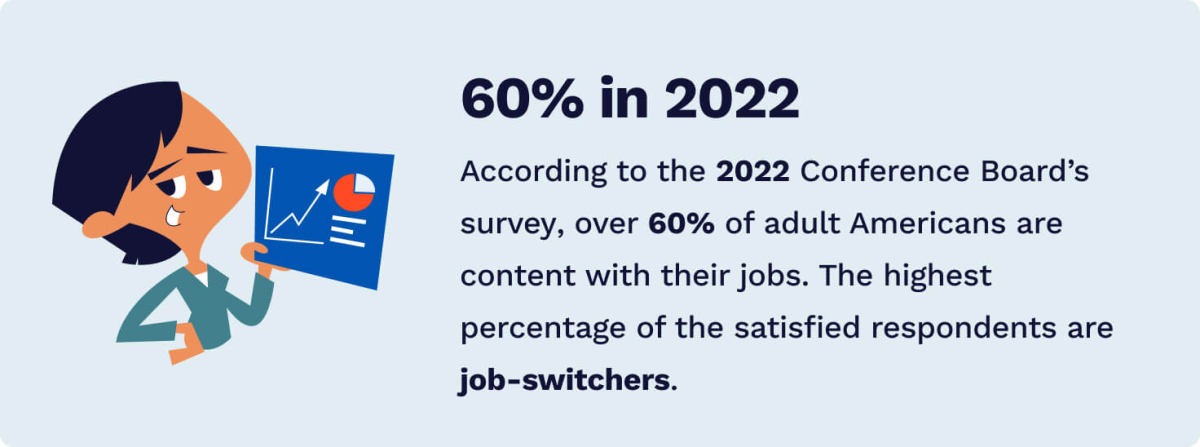
According to the 2022 Conference Board’s survey, over 60% of adult Americans are highly content with their jobs, which is a long-term trend. The percentage has been rising steadily over the past decade, improving by 20%.
Interestingly:
The greatest percentage of these satisfied respondents are people who have switched jobs. This means that people who have recently decided to change careers and follow their aspirations are the happiest among the American working population.
These facts suggest that people have become more self-aware, so they are looking for jobs that can give them more than just the figures on the payroll check at the end of the month. Seeking the best working conditions for yourself is the new normal, as a content employee is ready to deliver exceptional value to the company’s performance.
This article dwells on the principles and dimensions of job satisfaction and its role in a person’s life and organizational success. We also examine the top signs that it’s time to change jobs. Finally, we offer several essential tips for finding a dream job as well as blunders to avoid in that process.
😊 Job Satisfaction: What It Is & Why It Is Important
The first thing to understand is what it means to be satisfied with your job.
In broad terms, job satisfaction is measured by the degree of the employee’s sense of fulfillment in the workplace. If the person feels like waking up and going to their office, enjoys the work process, and is eager to continue at their job, it means that they are satisfied.
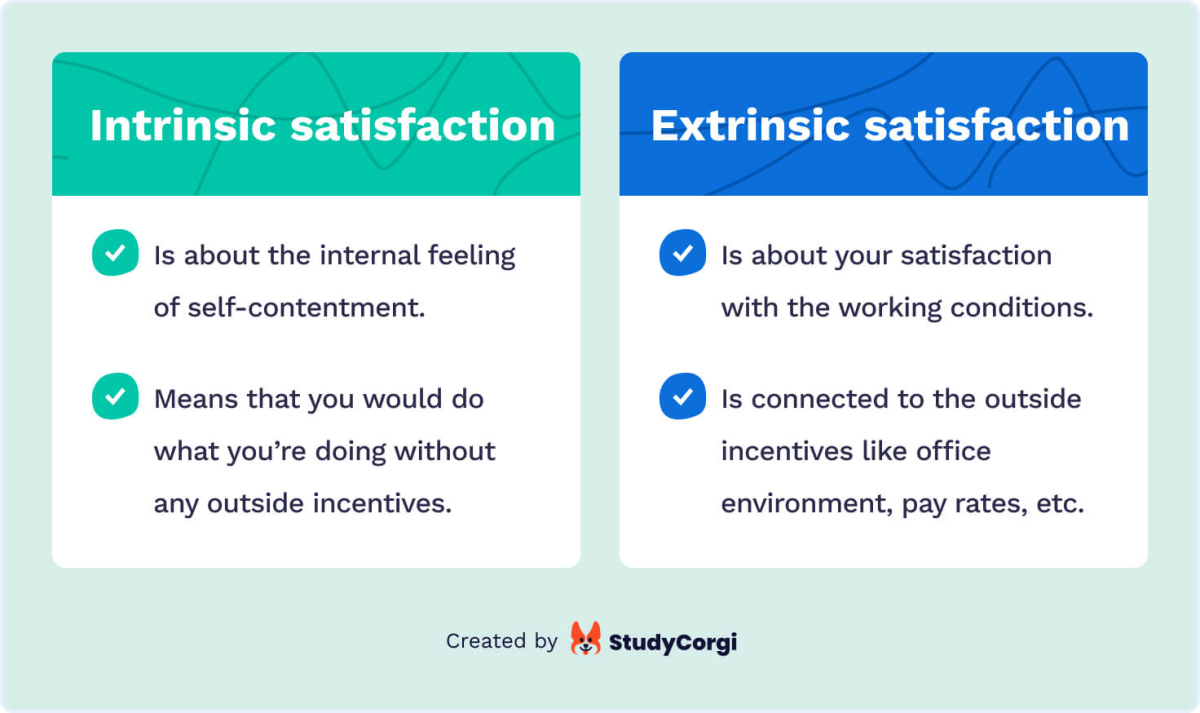
Job satisfaction comes in 2 dimensions:
- Intrinsic satisfaction is the internal feeling of self-contentment. If you love how you feel at the job and think about it positively, you’re intrinsically satisfied.
- Extrinsic satisfaction is used to evaluate your satisfaction with the working conditions and terms, such as the office environment, pay rates, and colleagues.
🤔 Why Is It Important to Love Your Job?
In most cases, the significance of job satisfaction is viewed from the employer’s perspective. Indeed, this parameter is vital for business success, as more satisfied staff are more productive, exhibit lower turnover rates, increase business profits, and nurture an exemplary work culture.
But:
What’s in it for you as an employee?
Well, it also comes with many vital benefits and bonuses:
- Better health. Workplace stress is the most widespread reason for the development of chronic health issues, both physical and mental. Therefore, working in a safe, positive environment and feeling fulfilled in the workplace contributes to sound health and immunity to stress-related health risks.
- Positive relationships. Colleagues are the people you spend most of your time with, so it is important to have long-term, positive relationships with them.
- Career opportunities. You’re more creative and resourceful at a job you love, so you have a better chance of receiving a promotion.
- Motivation. Employees with high job satisfaction levels are motivated to do more for their employer, which is a win-win situation for everyone.
- Life energy. If you do the work you like every day, you will feel satisfied, content, and energetic in all other life domains.
It’s Not Just About the Money
Many people link job satisfaction to pay rate, but the truth is far more complicated.
What does the research say about the determinants of job satisfaction? Most studies confirm that it’s not about the money.
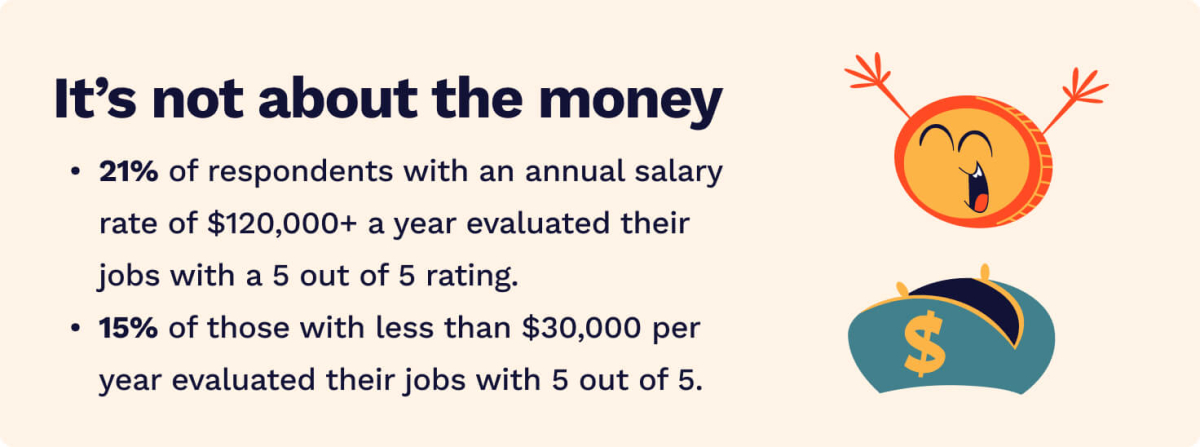
A recent survey by the Glassdoor team revealed that money matters in most cases, but it’s not the primary decisive factor. The researchers ended up with the following conclusions:
- Only 21% of respondents with an annual salary rate of $120,000+ a year evaluated their jobs with a 5 out of 5 rating.
- At the same time, 15% of respondents on the lower side of the earnings continuum – those with less than $30,000 per year, evaluated their jobs with a rating of 5 out of 5.
What do these figures suggest?
Regardless of how much a person earns, job satisfaction is a highly personal issue, even among those receiving small salaries. At the same time, top-earning employees may have many reasons to feel like they are not at the job of their dreams.
So, what additional factors affect the level of job satisfaction?
In most cases, these are:
- Culture and values
- Career opportunities
- Work-life balance
- Compensation and additional benefits
- Business mindset
- Senior leadership
So, if you work in a well-paid position but have poor relationships with your colleagues and boss, you have a valid argument to consider a career change.
🔰 10 Signs You Might Need to Change Jobs
Making the decision to change jobs may not be easy since most of us are conservative creatures who value stability in turbulent times.
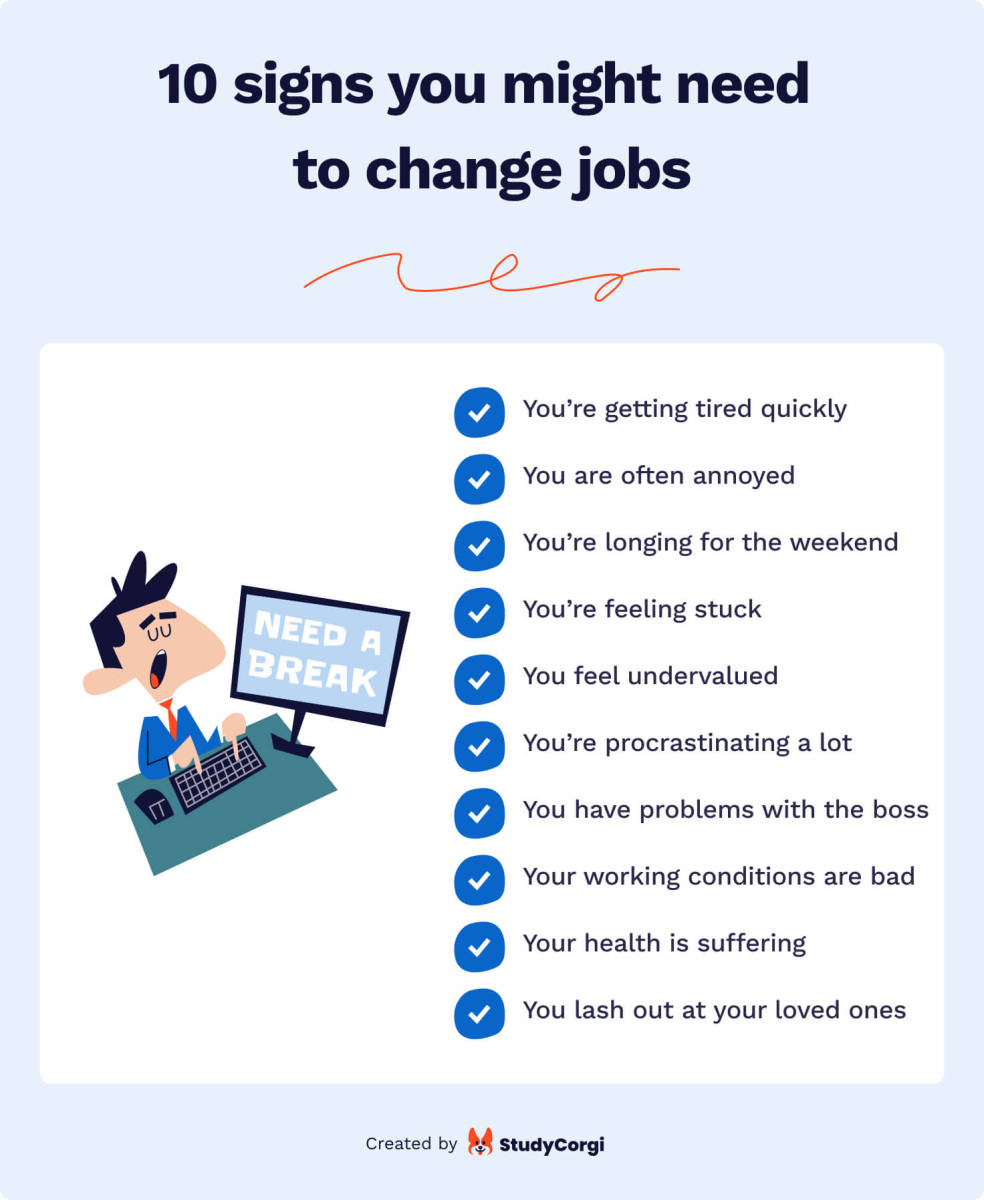
Yet, a couple of signs should alert you to the need to consider a new job.
1. You’re Getting Tired Quickly
We are sure you have experienced that inspirational, productive state of mind in which you’re successful and resourceful. It seems you could do your duties forever without getting distracted or tired.
You probably found yourself in this natural state when you were a child, doing something you loved. You can also achieve this state as an adult if you find a job you love and are passionate about. The opposite state is chronic fatigue that emerges when you apply too much effort to do what you have to accomplish at work.
There are 2 reasons for chronic exhaustion:
- The work is objectively too complicated
- You are experiencing burnout
Both are severe causes of chronic stress and health issues, so any of these reasons should be a good one to look into finding a new job.
2. You Are Annoyed by What Used to Please You
Routine tasks, interactions with colleagues, job requirements – if all these aspects of day-to-day professional activities used to excite you but now arouse only irritation, it’s a good reason to think your professional situation over.
Why so?
Negative emotions are part and parcel of our personal and professional lives, and it’s surely not a good idea to rush to resign from your current position because of a single conflict or occasional stressful situation.
Still:
It’s vital to track the overall emotional environment in which you’re working. Ideally, positive emotions should prevail over negative ones, creating a favorable emotional climate for mental well-being in the workplace.
3. You’re Longing for the Weekend
Employees should naturally feel comfortable at work, even if work routines are far from fun and pleasurable at every moment.
So:
If you feel uneasy when the weekend is winding down or experience physical discomfort, stress, or headaches when thinking about tomorrow’s work day, it’s a sure sign of the need to quit your job and find a more convenient position.
4. You’re Feeling Stuck
Moving up the career ladder is a natural expectation for all diligent, capable professionals at any job.
Thus:
The perspective of getting promoted or receiving a pay raise is a strong stimulant that adds to job satisfaction. When you see that you’ve exhausted all these opportunities and are stuck in one place with no growth prospects, it’s time to find a new job. This way, you will continue your personal and professional development, which is always motivating.
5. You Feel Like You’re Undervalued
No matter how much you earn, you should feel adequately valued in the workplace. It’s not only about the money (though compensation still matters a lot). You should be fairly evaluated by senior leadership and colleagues, receive only constructive criticism, and so on. If you are not treated well in your work environment and constantly feel that you’re worth more, then it’s time to change.
6. You’re Procrastinating a Lot
Overall, a bit of procrastination now and then is totally fine.
However:
Chronic procrastination and perpetual avoidance of work tasks should be a red flag for you. Obviously, the problem might not necessarily be your job. If you’re a chronic procrastinator, you need to solve this issue on your own.
Still, if you face trouble with procrastination while completing regular tasks that used to be done quickly and effortlessly and feel chronically ashamed of that stagnation, this points to an alarming situation. It can be a symptom of burnout or exhaustion at your current position and a need for a change.
7. You’re Having Problems with Your Boss or Environment
Returning to the Glassdoor team’s research, you can see that the strongest determinants of employee satisfaction are:
- Organizational culture
- Quality of leadership
- Work-life balance at the workplace
If you’re feeling uncomfortable with your colleagues or suffering from work calls after hours, there’s something to think about.
8. You’re Dissatisfied with Your Working Conditions
Many simple yet important factors affect employee satisfaction apart from the sum of money they earn.
These basic factors include:
- Time and effort you need to spend commuting to the workplace
- Physical working conditions (e.g., quality of lighting, fresh air, and more)
- Office hygiene
- Etc.
Thus, if you find your working conditions to be substandard, it’s better to quit and look for a safer and more comfortable place.
9. Your Health Is Suffering
Health issues are not necessarily linked to job dissatisfaction.
Yet:
If you consider that your health is deteriorating and feel uneasy or sad when you think about the next working day, it’s time to try out a career change. In most cases, people who didn’t like their previous job and finally found the job of their dreams miraculously experience health improvements physically, mentally, and emotionally.
10. You Lash Out at Your Loved Ones
Negative emotions you suppress at the workplace may spill over on your friends, family, and children. This is a disastrous habit you should curb at once. Don’t let a dissatisfying job deprive you of basic happiness and joy with your loved ones. Start taking firm steps to change the emotional climate at work (or the work itself) if you notice these negative outbursts at home.
💘 How to Find a Career You Love: 13 Proven Tips
Now that you’ve diagnosed your readiness for a career change, it’s time to find the job of your dreams. How can you find a job you love?
Here are 13 proven tips that will surely help you discover the answer.
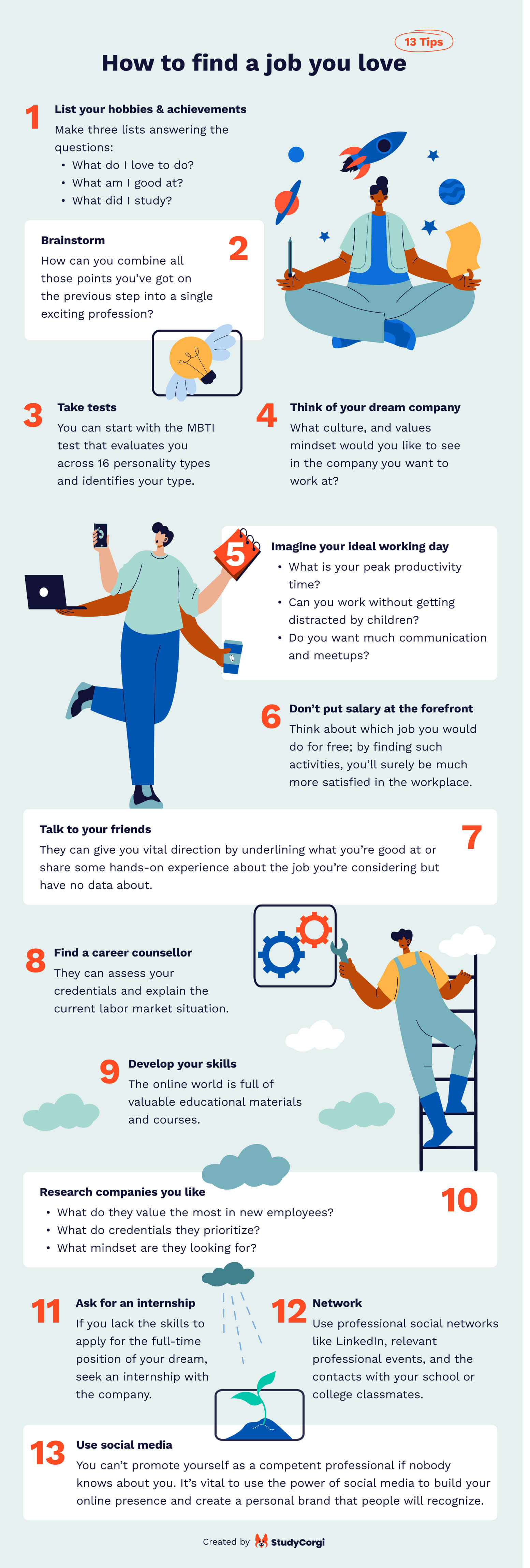
1. List Your Hobbies and Achievements
A good idea in the pursuit of your dream job that can make you really happy is to start with a list of activities that represent your interests. List your hobbies, things that inspire you, and achievements on a sheet of paper and think them over – how can you turn them into your career?
It makes sense to add a bit of structure to this soul-searching step. Divide a sheet of paper into 3 columns and make three lists answering the questions:
- What do I love to do?
- What am I good at?
- What did I study?
This type of structured examination will give you a balanced view of your skills, passions, and talents, allowing you to take a sober look at what could become a job that pays well and what should be kept as a hobby.
2. Brainstorm
Once you’ve come up with a detailed list of your interests, hobbies, and areas of knowledge, it’s time to brainstorm. How can you combine those points into an exciting profession? It’s okay to list even the most incredible options, since it’s only a rough list of ideas you’ll continue to refine.
Try to combine several points from your lists into one profession, such as:
I love writing and have a passion for manga. Career option: I can apply to manga magazines as a freelance writer or editor.
I love dancing and have a passion for video editing. Career option: I can become a video editor for professional dancers or record a course for amateur dancers.
You can experiment endlessly with what you included in your personal list of what you love and can do.
3. Take Tests
If you find it hard to list your skills and interests, you can seek external help with identifying your core competencies and passions.
A good solution in this case is to take a few tests, starting with the MBTI test, which is a great help in determining which job is right for you. The test evaluates you across 16 personality types and identifies your dominant type. After you get the results, you can refer to a career compatibility chart, which suggests the type of job from which you’re expected to derive maximum satisfaction.
Here are a couple of examples as an illustration:
- The Inspector (ISTJ) personality type is best fitted for business analytics, dentistry, public accountancy, supply chain management jobs, and the like.
- The Giver (ENFJ) personality is ideally matched with sales management, directing jobs, PR management, and guidance counseling, among others.
- Idealists (INFP) are the best at copywriting, HR management, physical therapy, artistic jobs, and photography.
Obviously, the MBTI test shouldn’t be the only guidance for your career choice. Still, it can offer valuable insights into the type of job you may benefit from, giving you a general direction in which you can move to find the job of your dreams.
4. Think About Your Dream Company
Another useful step is to think not about you but about the company you want to work at. What is your ideal work schedule? What culture and mindset would you like to see in the company? What values should the employer nurture to comply with your personal values and objectives?
Guiding points to think about include:
- Size of the company (a small family firm vs. a large corporation)
- Work schedule (office job, remote, or hybrid)
- Level of support (independent work or work in a team, under supervision)
- Formality (informal vs. highly formal work environment)
- Rewards (a high-paid job with a stable salary or a dynamic career ladder with many potential benefits for productivity and enthusiasm)
- Social impact (a socially conscious business with a strong emphasis on sustainability and social change)
- Innovation (a regular vs. innovation-focused company)
After considering all these aspects, you’re sure to have a clearer idea of what you’re looking for and which workplace will suit you best.
5. Imagine What Your Ideal Work Day Is Like
We’ve already touched upon this point in the previous section, but the work schedule is a subject worth paying much more attention to. Everyone has a unique biorhythm and productivity peaks. We all have varied family duties and circumstances that affect our work schedule preferences.
Thus, it’s vital to determine your ideal working time by answering the following questions:
- Is evening or morning your peak productivity time?
- When can you work productively without getting distracted by children and home routines?
- Do you want a lot of communication and meetings, or would you like to have a less interactive job?
Luckily, the modern labor market is flexible enough, and many people are able to negotiate with their employer and enjoy the benefits of a well-tailored daily schedule.
For example, if you’re a single mother and an owl by biorhythms, your ideal schedule as a copywriter may be as follows:
9 a.m. – 10 a.m.: Answering emails and project inquiries
10 a.m. – 1 p.m.: Producing content (while children are at school)
1 p.m. – 3 p.m.: Lunch and time for children
3 p.m. – 7 p.m.: Meetings with clients to discuss quotes for services, planning new projects, discussing feedback, implementing feedback
This way, you find time for your children, attend to job duties during your most productive hours, and avoid the stress of getting up early every morning – a factor that indisputably adds to overall job satisfaction and well-being.
6. Don’t Put Salary at the Forefront if There Is No Such Need
Obviously, salary matters when it comes to your dream job selection. For some people, money is the ultimate criterion, and that’s understandable. Yet, when you’re looking for a new job and you’re not in dire need of money, make sure you consider other factors as well.
A wise tip is to think about what job you would do for free. By finding such activities, you’ll surely be much more satisfied in the workplace, doing things that motivate you and receiving decent money for your work.
7. Talk to Your Friends
Even if you’re clueless about your strengths and core skills, there are always people around you who can give you objective, insightful feedback and advice. Ask your family, friends, and other people whose opinion matters to you and who know you well. They can give you vital direction by underlining what you’re good at or share some hands-on experience about the job you’re considering Your friends’ past job search experiences can also guide you throughout this process and help you avoid the dreadful blunders others made.
8. Find a Career Counsellor
Sometimes, you might need to consult with a competent expert in the career search field. Find a career development center near you and schedule a meeting with a counselor who can assess your credentials, discuss with you the current labor market situation, and advise you on some workable resources to use.
9. Develop Your Skills
Lifelong learning is the strategic skill that distinguishes successful career switchers from unsuccessful ones.
An important point to understand is:
Do you learn better online or offline?
The online world is full of valuable educational materials and courses, but you need to know exactly what you are looking for. We suggest making a list of subjects of interest in advance and then scanning the web for relevant educational materials. If you’re an offline learner type, look for the local schools, colleges, or training centers to enroll and embrace new knowledge with a team of like-minded people.
If you’re okay with the online education format, think over these starting points:
- TED talks. TED is an exciting database with inspirational performances and speeches of people who will make you look at problems from a totally unexpected angle. These lectures and public performances can boost your interest and help you determine a specific career path.
- Coursera. This is the most authoritative educational platform globally, with thousands of courses on all topics and subjects from renowned professors and universities. You can add Coursera certificates to a resume to show your credentials. However, Coursera education is more expensive when it comes to online education, and it’s only available in the online format.
- Masterclass. This resource is unique because all the workshops are delivered by famous and successful people in specific niches – important people within their industries. For instance, you can watch a lawn tennis masterclass from Serena Williams or a makeup lesson from Bobby Brown. Subscriptions are pretty affordable, starting from $10/year. Yet, these masterclasses are inspirational rather than educational in the classic sense of this word. Thus, Masterclass.com should be your supplementary educational platform, not the main one.
- Udemy. This online course platform is much more affordable than Coursera. However, the quality of educational material is not as good, and the courses offer less interaction between students and professors.
The offline learning world is also abundant in resources – you can attend local lectures and meetups, read books, and join interest clubs for networking. All of these opportunities are a sure step forward to pumping up your professionalism and getting that dream job.
10. Research Companies You Like
The best way to get hired by the company of your dreams is to become a perfect fit for them.
To achieve this, you should research the companies that interest you and find out:
- What they value the most in new employees
- What credentials they prioritize
- What kind of mindset they’re looking for
This information will allow you to compose an excellent cover letter and sound like the person they need at a job interview.
11. Ask for an Internship
If you lack the skills and competencies to apply for the full-time position of your dream, it may help to seek an internship with the company. Many students start as interns in large corporations while still studying at college or university, and they end up being offered a job if they showcase their diligence and talents during the internship program.
To maximize your chances for an internship:
- Create a professionally-looking email, and be mindful of the content in your social media accounts.
- Write personalized cold emails to the contacts in the department that interests you.
- Craft a professional resume.
- Be straightforward and polite in your communication.
12. Network
Networking is at the heart of a successful career. It involves your ability to connect with people on a professional level and expand your professional circle.
This can be done:
- Via professional social networks like LinkedIn
- At relevant professional events (e.g., conferences and meetups)
- Through a revival of contacts with your school or college classmates (if you discover they work in your relevant industry).
By growing your network, you will become more visible as a professional and gain access to more career opportunities and credibility in your professional niche.
13. Use Social Media Platforms
You can’t promote yourself as a competent professional if nobody knows about you. Thus, it’s vital to use the power of social media to build your online presence and create a personal brand that people will recognize. We recommend prioritizing professional networks like LinkedIn and Facebook and using other social media for interactive communication.
❌ 4 Don’ts for Those Who’re Looking for Their Dream Job
Here are a couple of blunders you may make on the path to your dream job. Avoiding them will make your journey to success shorter and much more enjoyable.
Don’t Spray & Pray
“Spraying” your job search efforts means trying to hit as many targets as possible without strategy and planning. This is a counterproductive path, as it wastes your time and effort, causing you to deviate from what you really love and want.
Don’t Be Afraid to Reach Out to People
Please keep in mind that most successful people weren’t born this way; they had to travel a long path to success and recognition. You also have a path in front of you, and there’s no sense in being ashamed of a lack of achievements at this stage. Don’t be afraid to get in touch with people and inquire about internships or growing your network; these are small steps to success that you can take.
Don’t Say Yes If You’re Not Sure
Getting the first job offer is very reassuring; there’s a strong temptation to say “yes” at once. Still, you should take one step back and revisit your initial career change goal, asking yourself whether it’s indeed the dream job you’ve been looking for. If you’re eager to agree to the first offer, the risk is high that you will end up disenchanted and demotivated pretty soon. It’s vital to be 100% confident that this is indeed the job you envisioned before giving a confirmation.
Don’t Give Up
Once you’ve set concrete terms for a dream job, finding it may become a lifelong challenge – not everyone is ready for that, especially since you will probably receive a couple of rejections in the process. The main point here is not to betray your priorities and values, though you may adjust the search criteria if you notice that it has become too unrealistic.
Now that you’re equipped with excellent advice showing how to find a job you like and make the most of a fulfilling, enjoyable career, you can apply this knowledge to diagnose your current job and formulate a clear vision of the dream job that will give you the best work-life balance, a sense of self-fulfillment, and wellness you deserve.
